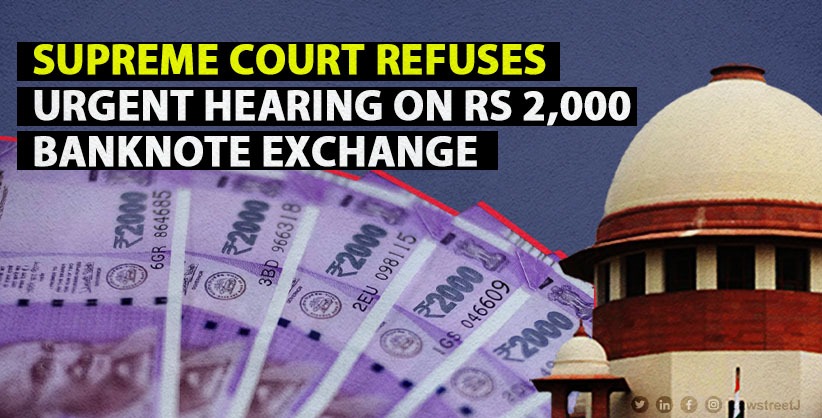NEW DELHI: The Supreme Court on Thursday declined to consider a plea for urgent hearing against the Delhi High Court's May 29 judgement that allowed exchange of Rs 2,000 currency notes without any identification slip.
Appearing in person, advocate Ashwini Kumar Upadhyay submitted that all the kidnappers, gangsters, drug smugglers etc are exchanging their money. He referred to media reports to claim Rs 50,000 crores have been exchanged in last one week. He asked the court to grant urgent hearing in the matter.
A vacation bench of Justices Sudhanshu Dhulia and K V Viswanathan, however, told Upadhyay that the court is not taking up these kinds of cases during summer vacation.
"You can always make a mention to the Chief Justice of India after the vacations, the bench said.
Upadhyay insisted that money is being exchanged by mining mafias, kidnappers, there is no requirement of requisition slip and identity proof.
This is happening for the first time in the world. I filed a writ in the Delhi High Court and the high court disposed of the matter without issuing notice. This is happening for the first time in the world as the entire black money will become white," he contended.
The bench, however, maintained, "We are doing nothing, you may bring it to the notice of the RBI."
In his special leave petition, Upadhyay contended that the High Court has failed to appreciate that the RBI and SBI's notifications issued on May 19 and 20 respectively gave an opportunity to legalise illegal money, and therefore was manifestly arbitrary, irrational and violative of fundamental right to equality.
The High Court had on Monday dismissed the PIL, saying this is a purely policy decision related to withdrawal of banknotes and it cannot be said to be perverse or arbitrary or it encouraged black money, money laundering, profiteering or corruption.
He said RBI admits in para-2 of the notification that total value of Rs 2000 banknotes in circulation have declined from Rs 6.73 lakh crore to 3.62 lakh crore.
He submitted that this 3.11 lakh crore has reached individuals locker and the rest has otherwise been hoarded by the gangsters, kidnappers, contract killers, illegal arms suppliers, money launderers, drug smugglers, hootch peddlers, human traffickers, gold smugglers, black marketeers, spurious medicine manufacturers, tax evadors, cheaters, looters, separatists, terrorists, maoists, naxals, mining mafias, land mafias satta mafias and corrupt government employees, public servants and politicians.
The High Court has failed to appreciate the notifications gave an open opportunity to legalise illegal money, hence were totally contrary to the aims and objects of the Prevention of Corruption Act, Benami Transactions Act, Money Laundering Act, Lokpal & Lokayukta Act, Central Vigilance Commission Act, Fugitive Economic Offenders Act and Black Money Act.
Around 30 crore families reside in India and 130 Crore Aadhaar Card have been issued. Thus, it can be reasonably assumed that each family has 3-4 Aadhaar card. Similarly, total number of accounts are 225 Crore out of which 48 crores are Jana Dhan accounts of BPL families. It means that even the EWS and BPL families are connected with Bank. Therefore, granting the permission to exchange Rs. 2000 banknotes without depositing them in the bank account or even without obtaining any form of requisition slip and identity proof is manifestly arbitrary, irrational and thus violates Article 14, he said.
He also submitted that 80 Crore EWS-BPL Indians receive free grains every month so it can be reasonably assumed that 80 crore Indians rarely use 2,000 banknotes. Therefore, the petitioner sought direction to RBI and SBI to take appropriate steps to ensure that Rs 2000 banknotes are deposited in bank accounts only.
The corruption has devastating effects on equality, justice, liberty, fraternity unity national integration and basic rights guaranteed under Articles 14, 19 and 21. Even after 75 years of the independence, none of our districts are free from bribery, black money, benami transaction, disproportionate asset, tax evasion, money laundering, profiteering, grain hoarding, food adulteration, human-drug trafficking, black marketing, cheating, fraud, mischief, forgery, dishonest misappropriation of property, criminal breach of trust, dishonestly inducing property, cheating by personation, concealment of property falsification of accounts, economic offences including corporate, capital market and forensic fraud and violation of accounting company taxation and information technology laws. Similarly, no district is free from the clutches of land mafias, drug mafias, mining mafias, betting Mafia, tender mafias, hawala mafias, illegal infiltration mafias, conversion mafias and corrupt employees, bureaucrats and politicians, his plea said.
The Rule of law guaranteed under Article 14; right to trade guaranteed under Article 19; and right to clean air, right to drinking water, right to health, right to peaceful sleep, right to shelter, right to livelihood guaranteed under Article 21 and right to education guaranteed under Article 21A; cant be secured without curbing corruption, black money generation and benami transaction but by this recent flawed and arbitrary decision, RBI is permitting banks to convert black money into white, he contended.
"India cannot move forward without clean-transparent governance for which corruption free society is a basic requirement. Right to life guaranteed under Article 21 cannot be secured and the goalden goals of Preamble cannot be achieved without weeding out black money generation, benami transaction and disproportionate assets. Hence, it is the duty of RBI to identify black money holders and not to provide them with legal means to legitimize their black money," his plea said.
Due to massive corruption, our performance in the Rule of Law Index is very poor. India ranked 66 in 2011, 67 in 2012, 66 in 2013, 68 in 2014, 59 in 2015, 66 in 2016, 66 in 2017, 66 in 2018 and 68 in 2019. Right to trade & business is integral part of Article 19 but we never ranked even among top 50. In Ease of Doing Business Index, India ranked 63 in 2019, 77 in 2018, 100 in 2017, 130 in 2016, 130 in 2015, 142 in 2014, 134 in 2013, 132 in 2012, 132 in 2011, 134 in 2010, 133 in 2009, 122 in 2008, 120 in 2007, 134 in 2006 and 116 in 2005. But States have not taken apposite steps to weed-out bribery black money generation benami transactions disproportionate assets and now giving safe means to legalize the illegal black money, it added.

















